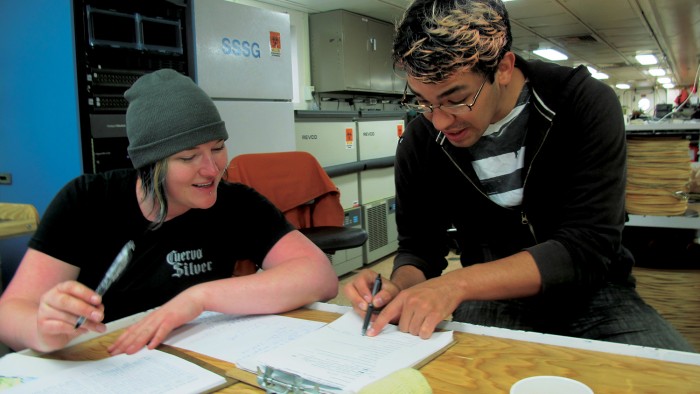Seagoing Experience Promotes Student Interest In Science

Each year, about one million U.S. high school freshmen declare interest in a field related to science, technology, engineering or math (also known as STEM fields)—more than one in four. But by the time they graduate, more than half lose interest in a STEM career.
Dean Livelybrooks is helping to reverse that trend. The UO geophysicist is part of a national effort to feed the nation’s growing need for scientists and engineers by promoting STEM careers among students in K–12 schools and community colleges.
For five years, he has run a program that brings twenty to thirty community college students to the UO each summer to get hands-on experience working in research.
Last year was also the third year that Livelybrooks found space for community college students on research vessels in the Cascadia Initiative, under the CC@Sea program. The students work with earthquake data, seismology equipment and telecommunications efforts, all under the eyes of experts in those fields.
“There are a lot of people in community college who have never really met a scientist or engineer and don’t know what those jobs are like,” Livelybrooks said during an interview on the ship. “Out here, they’re witnessing lots of scientists and engineers in action and working as a team. They’ll be able to go back to their institutions and say, ‘This is what we did out on the Atlantis.’”
“My hope,” he added, “is that this experience will not only inspire them to go further with science, but also serve to inspire their peers to consider careers as scientists and engineers.”
Education and outreach are fundamental objectives of the earthquake initiative, and students on the Atlantis enjoyed a rare opportunity to be active participants in reaching out to others. They conducted live broadcasts of the ship’s research missions through a program that reaches more than 1.5 million students and teachers around the world.
Ocean Exploration Trust, which engages educators and students in ocean exploration, was founded by Robert Ballard, an oceanography professor at the University of Rhode Island who, in 1985, discovered the wreck of the Titanic. Under the program, students on research vessels in Ballard’s fleet are connected, by satellite, to audiences in marinas, theaters and other venues; students on the Atlantis, for example, narrated the play-by-play of dives by Jason, the ship’s remotely operated vehicle (ROV), as a camera attached to the robot displayed underwater images on a screen.
During a recent Atlantis trip, Jonás Cervantes of Linn-Benton Community College (above, right, with colleague Haley Domer), discovered an aptitude for telecommunications. The physics major helped work out the technological bugs in broadcasting live from the Pacific Ocean, and he seemed as comfortable in front of the camera as behind it; Cervantes shot other students as they described the action and also provided commentary himself.
As a member of a Linn-Benton team that distinguished itself at an international competition to build an ROV, Cervantes jumped at the chance to join the Atlantis mission and see an ROV up close and personal. He plans to use the experience to encourage his peers to get interested in STEM careers.
“I’ve always wondered how research is actually carried out in the field,” Cervantes said, during a break from one of his shifts as a watchstander on the ship. “It’s fun; I really enjoy it. One of my main goals is to get more people interested in science.”
— Matt Cooper


 Twitter
Twitter Facebook
Facebook Forward
Forward